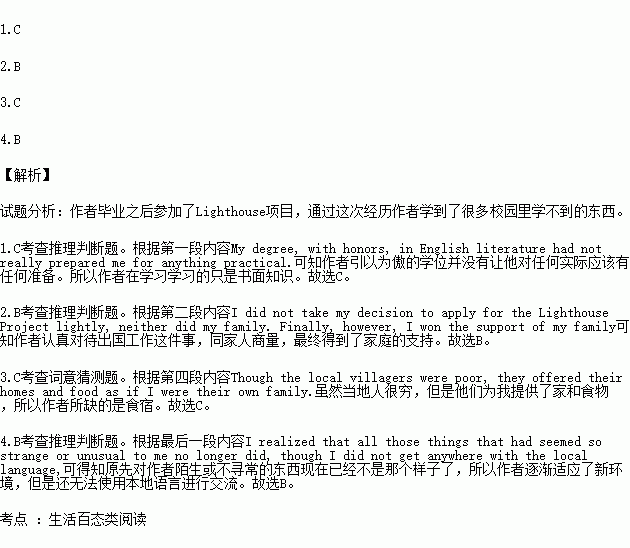题目内容
Like many new graduates, I left university full of hope but with no real idea of what I wanted to do. My degree, with honors, in English literature had not really prepared me for anything practical. I knew I wanted to make a difference in the world somehow, but I had no idea how to do that. That’s when I learned about the Lighthouse project.
I started my journey as a Lighthouse Project volunteer by reading as much as I could about the experiences of previous volunteers. I knew it would be a lot of hard work, and that I would be away from my family and friends for a very long time. In short, I did not take my decision to apply for the Lighthouse Project lightly, neither did my family.
Finally, however, I won the support of my family, and I sent in all the paperwork needed for the application (申请). After countless interviews and presentations, I managed to stand out among the candidates and survive the test alone. Several months later, I received a call asking me to report for duty. I would be going to a small village near Abuja, Nigeria.
After completing my training, I was sent to the village that was small and greatly in need of proper accommodation. Though the local villagers were poor, they offered their homes and food as if I were their own family. I was asked to lead a small team of local people in building a new schoolhouse. For the next year or so, I taught in it. But I sometimes think I learned more from my students than they did from me.
Sometimes during that period, I realized that all those things that had seemed so strange or unusual to me no longer did, though I did not get anywhere with the local language, and I returned to the USA a different man. The Lighthouse Project had changed my life forever.
1.What do we know about the author?
A. His dream at university was to become a volunteer.
B. He took pride in making contributions to the world.
C. His university education focused on the theoretical knowledge.
D. He had dreamed about being a volunteer since he was in college.
2.According to paragraph 2, it is most likely that the author __________.
A. felt happy to leave his family and friends.
B. discussed his decision with his family.
C. asked previous volunteers about voluntary work.
D. attended special training to finish difficult tasks.
3.The underlined word “accommodation” in paragraph 4 means ________________.
A. drinking water.
B. English teachers.
C. living places and food
D. teaching buildings.
4.What can we infer from the author’s experiences In Nigeria?
A. He was chosen as the best teacher by his students.
B. He found some difficulty getting used to the local culture.
C. He had learned to communicate in the local language.
D. He had overcome all his weakness before he left for home.

